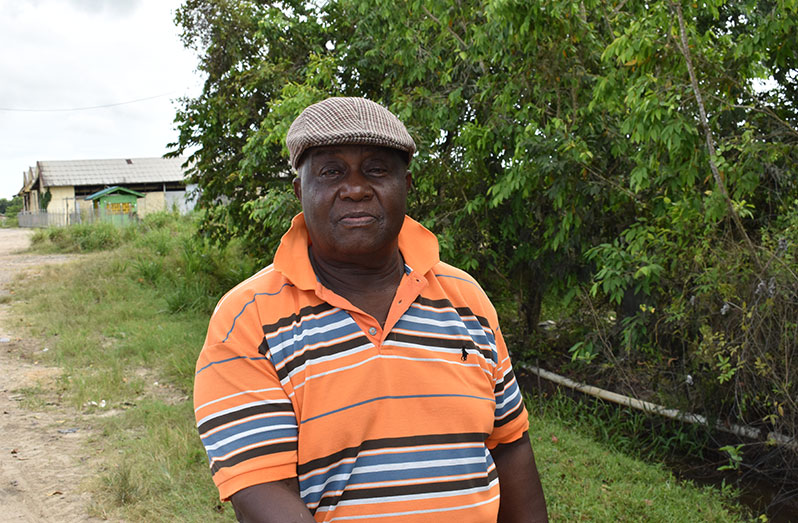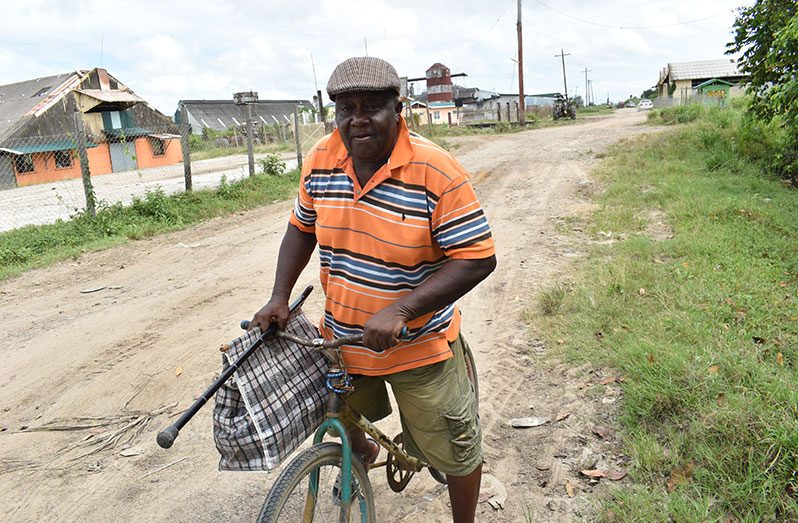JAPETH Williams is the Chairman of Burma Housing Scheme, West Coast Berbice and he would make representation for the people at the regional level and upwards.
The 70-year-old has a small roadside shop by the Saj Rice Mill Complex in the village and he would ride his bicycle during the week to go to his small business but when it rains, it is difficult to navigate through the muddy road.
He displayed some cuts and bruises he received on his feet due to the condition of the road, which caused him to fall off his bicycle many times.
Williams is also a cattle and poultry farmer who suffered losses of his livestock when their village was flooded.
The father of seven added that he has been residing in Burma Housing Scheme since 1968, but he is originally from Belladrum, West Coast Berbice.
He had left his home village in search of work when the rice mill was then state-owned and things were good in Burma.
Williams recalled that back then, they had more than 600 workers at the rice mill and people from all over came to find work and eventually settled in the village.

Sadly, today only sections of large, sprawling, old, weathered buildings remain of what was once a booming rice mill which was eventually privatised.
Some old oil boilers, workshops, stores, mills, and silos are still there but many outbuildings, such as the administrative building, are gone.
“At that time, the train used to pass through the village carrying parboiled rice and other goods and when the rice mill operations folded, it was leased to some foreigners and today a group of foreign investors are operating the rice mill,” he said.
Williams remembered that when he used to work at the MARDS Rice Mill, the area was transformed into a large shopping plaza where people were plentiful, selling all kinds of things and people used to stay overnight for the Friday Market Day.
He recalled that Friday was payday for rice workers and it was big spending then and things were really good.
Williams reported that Burma Housing Scheme was developed for ricemill workers because they came from all over and accommodation was a problem.
The then government allocated lots to rice mill workers and government houses were built for them, just two of these colonial-style wooden houses still exist.
Williams reported that since the flood people were in the area sharing out cleaning supplies and a Medex would visit monthly.
“The sad part about living in here is, we do not have the rice lands to cultivate rice but the outsiders do, many acres of lands were leased to them and they have control of it,” he said.
Williams added that even though lands were promised to them, they never benefitted except for 23 acres, which the villagers rotate to plant rice.
The Chairman of the village stated that he has a few cows, some ducks and fowls and he would try with them as his livelihood but suffered losses of his cattle when the floods came earlier this year.
Williams would also go by his snackette by Saj Rice Mill to sell some snacks and cold beverages to rice mill workers on weekdays.
He reported that the koker in the village is blocked and not functioning and that needs to be fixed before the rains come again.




.png)









